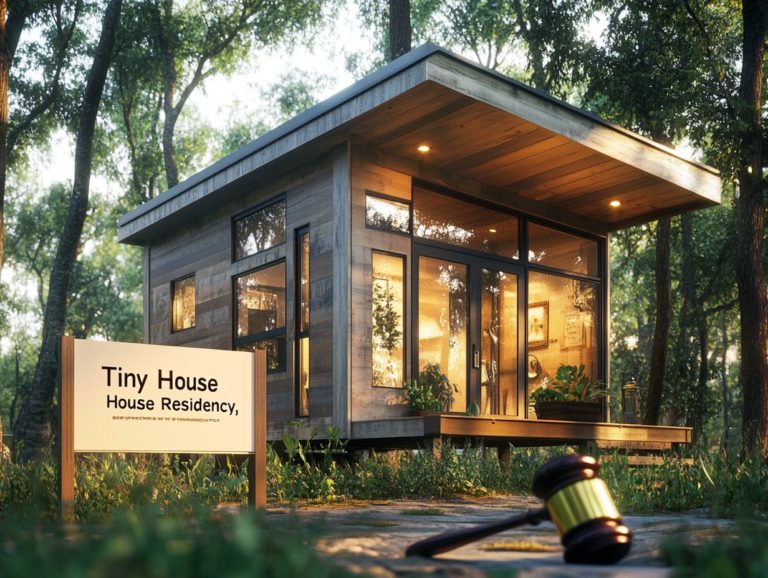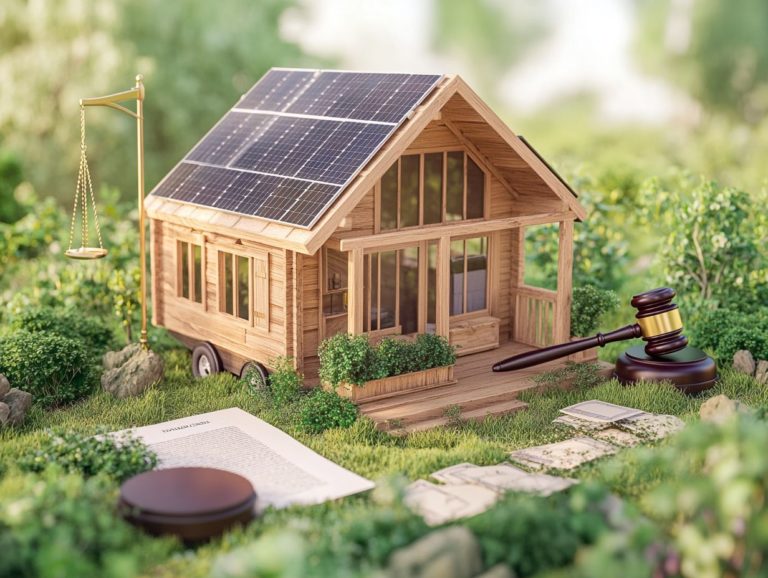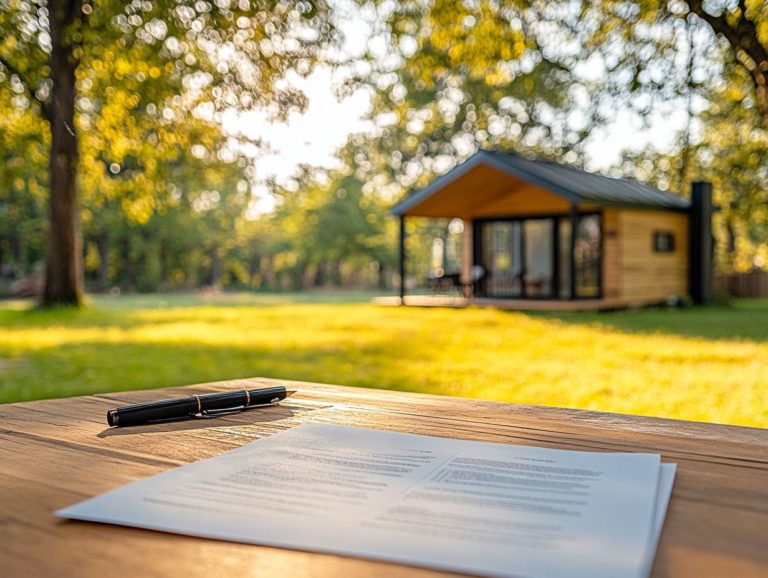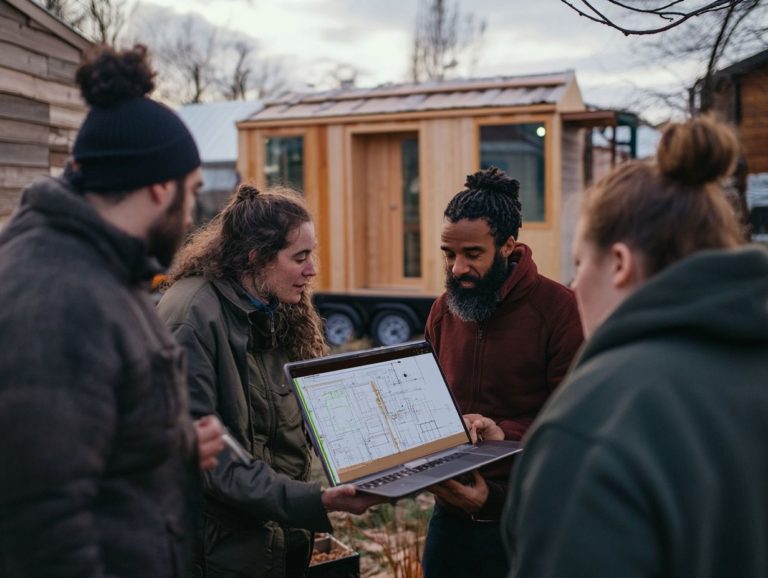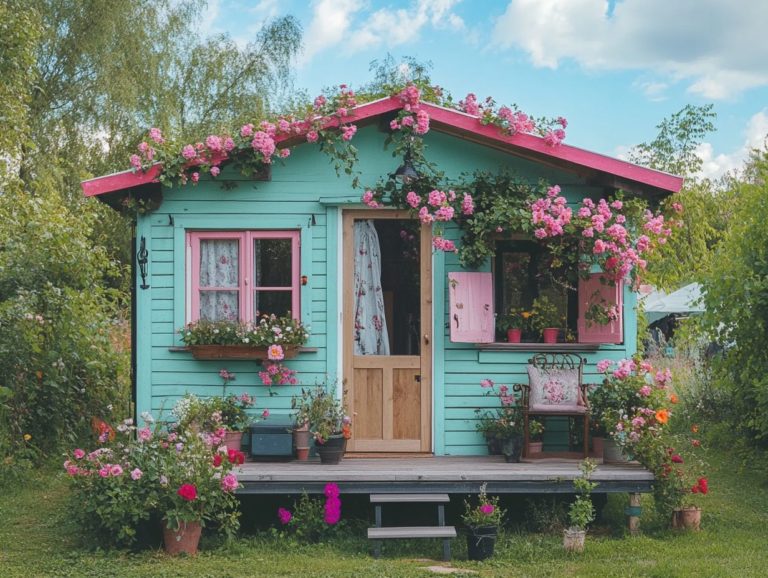Common Legal Questions About Tiny Houses
The tiny house movement has gained remarkable traction. It captures the hearts of those who crave a minimalist lifestyle or seek financial freedom.
Many people desire a cozy, efficient living space. This movement has seen a rise in tiny house builders and communities.
Navigating the complex laws of tiny home ownership can seem daunting. This article guides you through zoning laws, building codes, financing options, and insurance coverage.
You will uncover the rights and responsibilities that come with tiny house living. You ll also find answers to common legal questions.
Join us as we explore the legal details of tiny house ownership. Empower yourself on your journey toward a simpler, sustainable lifestyle in a tiny house village.
Contents [hide]
- Key Takeaways:
- Legal Considerations for Tiny Houses
- Financing and Insuring a Tiny House
- Living in a Tiny House: Rights and Responsibilities
- Common Legal Questions About Tiny Houses
- Frequently Asked Questions
- Can I legally live in a tiny house on my own property?
- Do I need a building permit to construct a tiny house?
- Can I park my tiny house on someone else’s property without their permission?
- Do I need to have a specific type of insurance for my tiny house?
- Are there any legal restrictions on where I can park my tiny house?
- Can I permanently live in a tiny house on wheels?
Key Takeaways:
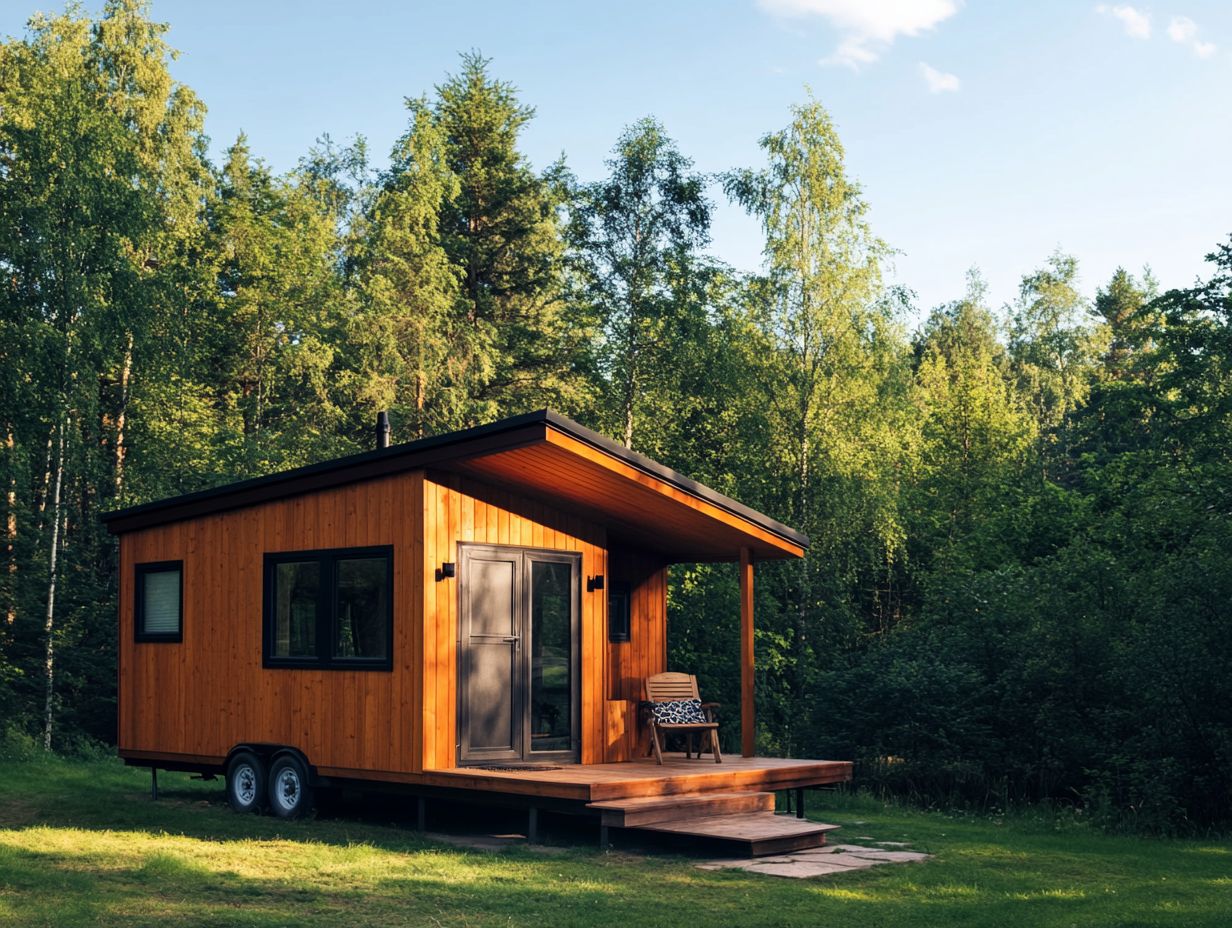
- Understanding zoning and building codes is crucial when considering a tiny house. They may limit where and how you can build.
- Financing and insuring a tiny house can be challenging, but options do exist. Researching and carefully considering your choices is important.
- As a tiny house owner, you have legal rights and responsibilities. Knowing these is essential for a smooth living experience.
Defining Tiny Houses and Their Popularity
Tiny houses, often known as tiny homes, are part of a growing movement focused on minimal living and sustainable lifestyles. These cleverly designed residences typically range from 100 to 400 square feet.
People drawn to tiny homes aim to reduce their environmental impact and simplify their lives. Shows like *Tiny House Nation* and influencers like Tiffany showcase the charm of tiny houses, offering affordability and creative living options.
The tiny house movement promotes the idea that less is more. This encourages you to downsize and focus on experiences instead of material possessions.
This shift attracts a diverse group, from ambitious young professionals to adventurous retirees. Many are enchanted by the practicality of these compact homes and unique tiny house floor plans.
Visionaries like Tiffany create designs that blend functionality with aesthetic appeal. Examples include lofted sleeping areas and eco-friendly materials, making each space uniquely yours.
In Florida, tiny living communities meet the urgent demand for affordable housing. They foster a profound sense of belonging and emphasize shared values of sustainability and simplicity.
These tiny house communities become vibrant spaces for residents to share experiences and knowledge. They offer a lively alternative to traditional homeownership, transforming the dream of simple living into a delightful reality.
Legal Considerations for Tiny Houses
Understanding the legal aspects of tiny houses is essential for potential owners. Zoning laws and building codes play a major role in this process.
With the rising popularity of tiny homes, local zoning departments are creating regulations that reflect their needs. It s important to familiarize yourself with these rules.
Appendix Q of the International Residential Code provides a framework for building tiny homes. This ensures safety and compliance with local standards.
Familiarizing yourself with these codes is vital. Obtaining the necessary tiny house insurance will safeguard your investment and help you abide by local regulations.
Zoning and Building Codes
Zoning and building codes are crucial players in the acceptance and establishment of tiny houses within different communities. Each region has its own unique zoning laws that can either pave the way for tiny house developments or create significant barriers. Understanding these regulations is vital for anyone considering a tiny house, as they dictate everything from acceptable lot sizes to necessary infrastructure. This ultimately shapes your living experience and the features of tiny homes in your area, such as utility bills for tiny houses.
These regulations can influence not just the footprint of your tiny home but also the materials permitted, required safety features, and even rules for how homes should look to ensure that your home blends harmoniously with its surroundings.
For instance, some municipalities have welcomed tiny houses with open arms, permitting them in existing residential zones. Others may confine them to designated tiny house parks. This creates lively communities like those found in Oregon and Colorado, where innovative designs thrive under supportive zoning regulations. These regulations promote sustainability and affordable housing options, connecting you with others through platforms like Tiny House Central.
On the flip side, in regions with stringent codes, you might encounter obstacles that hinder the very essence of tiny living. This may prompt you to devise creative solutions or limit your choices.
Permits and Regulations
Obtaining the necessary permits and understanding regulations are integral steps in your journey to building a tiny house. As a tiny house builder, you ll need to navigate through various local and state regulations governing construction and occupancy. This often requires multiple permits depending on your location and how you’ve designed your home, particularly if you are considering DIY tiny home options.
Engaging with the zoning department early in your planning process can streamline approvals and help you sidestep potential legal pitfalls. This ensures you are following the rules tailored for tiny living and allows you to find suitable parking for your tiny home.
This proactive approach allows you to clarify the types of permits you may need, which could include building permits, electrical permits, and plumbing permits each varying significantly by region. Many jurisdictions impose specific regulations related to property size, setbacks, and occupancy limits. These will impact your tiny house construction, especially when considering the transporting of tiny houses.
Understanding these requirements helps you avoid costly fines or construction delays and facilitates a smoother transition into the tiny living lifestyle you desire.
When you follow proper permitting protocols, you re not just ticking boxes; you re contributing to sustainable community planning and securing your investment against future zoning disputes that might arise for Florida tiny houses.
Financing and Insuring a Tiny House
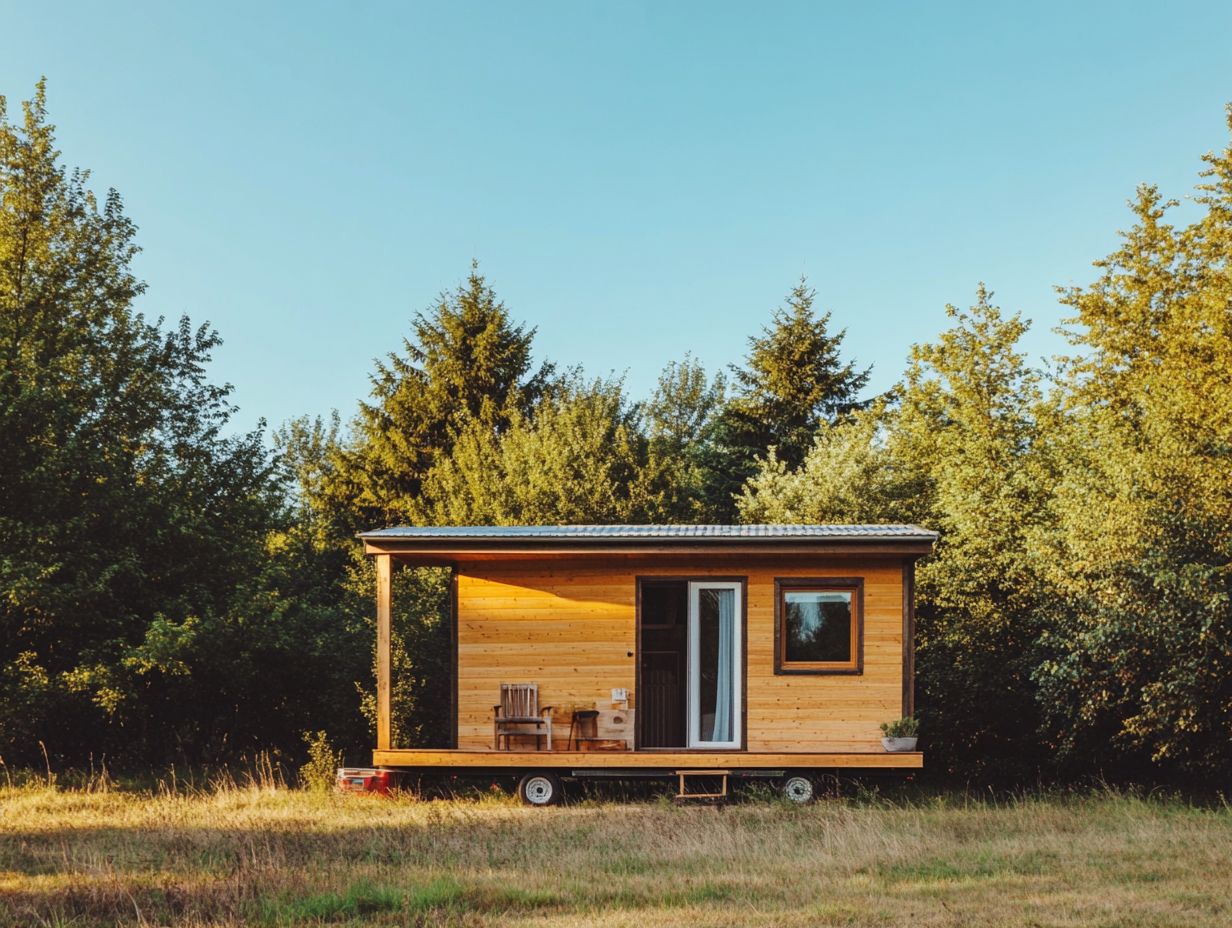
Thinking about a tiny house? You’re not alone! Financing and insuring a tiny house can present unique challenges, but rest assured, there are several options at your disposal as a prospective owner. Given that tiny homes typically carry lower costs than traditional houses, you might find yourself exploring various financing avenues. Consider options like personal loans, RV loans, or even innovative strategies like crowdfunding. These can be especially beneficial for tiny house design.
Once you’ve secured your financing, it s essential to delve into tiny house insurance to safeguard your investment. Companies like Strategic Insurance, Progressive, and Great Lakes Insurance provide coverage specifically tailored for tiny homes, ensuring you’re well-protected against risks associated with moving tiny houses.
Don t miss out on your chance to create a cozy space! Act now to find the best financing options available!
Options for Financing
When you re considering purchasing a tiny house, you have several financing options to explore. Each option offers unique advantages. Traditional methods, like personal loans, often come into play, especially since tiny houses usually come with a lower price tag compared to conventional real estate. This makes them an attractive choice for many.
You might also find yourself attracted to RV loans, which are designed for mobile living spaces. These can provide the flexible terms that resonate with the tiny house lifestyle.
Your individual financial situation and goals can significantly influence your choice of financing. This impacts not just ownership, but also how you budget for maintenance and additional expenses that come with tiny home living. Personal loans are typically unsecured, allowing you to secure funds without the need for collateral, ideal if you prefer to maintain maximum flexibility.
On the other hand, RV loans might offer lower interest rates, especially if your tiny home qualifies as a mobile unit. However, they often come with certain requirements your home needs to fulfill. By understanding the nuances of these financing methods, you can select a plan that aligns with your budget and supports your lifestyle aspirations. This is particularly important if you’re looking to establish a tiny house community.
Insurance Coverage for Tiny Houses
Securing adequate insurance coverage for your tiny house is essential to protect your investment and ensure peace of mind. Tiny house insurance is tailored specifically for smaller homes and can cover a range of issues from damage to theft and liability. This ensures you are protected whether your home is stationary or transporting tiny houses.
These policies often provide options for replacement cost coverage, allowing you to fully rebuild or repair your home without the burden of out-of-pocket expenses. This type of coverage ensures you have the funds needed to restore your home to its original condition.
Specialized tiny house insurance addresses unique factors such as mobility and specific risks associated with living in a less traditional setup. Companies like Strategic Insurance, Progressive, and Great Lakes Insurance recognize these distinctions and offer tailored options that meet your needs as a tiny house dweller. This is in stark contrast to standard home insurance policies, which may not adequately cover specialty structures or unique risks.
Start exploring insurance options today to protect your tiny home!
Living in a Tiny House: Rights and Responsibilities
Owning a tiny house brings a unique blend of rights and responsibilities. Each tiny house community often has its own specific guidelines that dictate everything from parking rules to the use of shared amenities.
Grasping the legal rights tied to tiny house ownership is essential. It enables you to care for your home and helps you navigate the nuances of living in a close-knit community.
Legal Rights as a Tiny House Owner
As a tiny house owner, understanding your legal rights is crucial, especially given the patchwork of local regulations. Your rights may include the ability to park your tiny house in designated areas, access essential utilities, and the right to be part of a tiny house community.
Engaging with the zoning department can clarify these rights and assist you in navigating any challenges in your living situation. Local zoning laws often specify where tiny houses can be legally parked, and in many cases, a special permit may be required.
Access to fundamental utilities, such as water, electricity, and sewage connections, can be dictated by municipal codes. It s vital to inquire about allowable hookups before you settle in.
Your rights concerning community participation are equally important. Many localities permit tiny house residents to join homeowner associations or community boards, giving you a platform to advocate for your interests. Familiarizing yourself with local regulations not only empowers you but also cultivates a sense of belonging and advocacy within your community.
Responsibilities for Maintenance and Upkeep
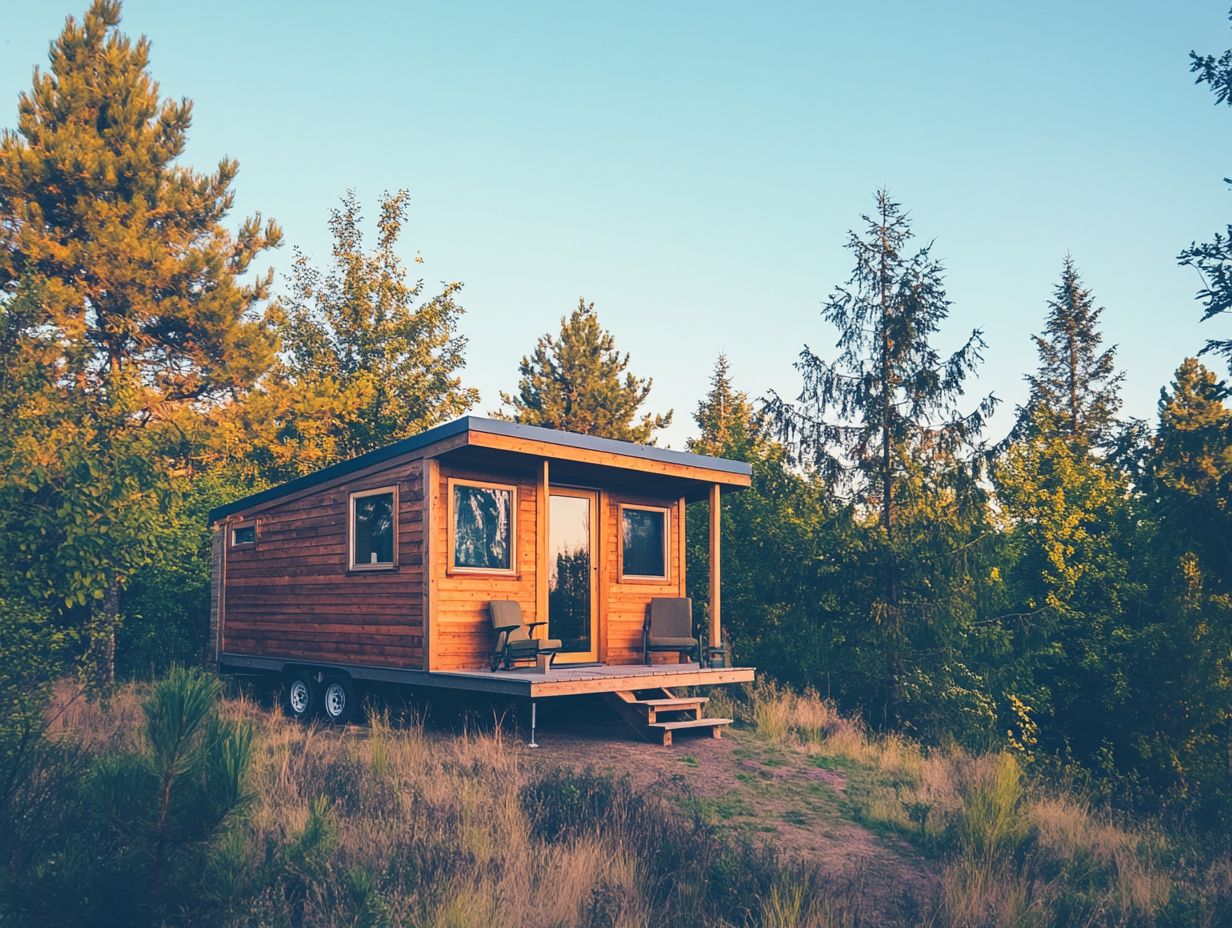
Owning a tiny house comes with important responsibilities. Regular inspections and repairs are essential to ensure your home lasts and functions well.
Addressing repairs like plumbing or electrical issues quickly can save you from costly problems later. Keeping your outdoor spaces looking good boosts your home s appeal and benefits the neighborhood.
Follow local zoning laws and safety regulations. These rules help maintain safety and harmony in the community.
Your dedication to maintenance shows pride in ownership. It also helps you feel more connected to your community.
Common Legal Questions About Tiny Houses
As you explore the tiny house movement, you may have many legal questions about ownership.
Typical inquiries focus on zoning rules, insurance needs, and whether tiny houses can be in residential areas. Understanding these topics helps you make informed decisions.
Answers to Frequently Asked Questions
The tiny house movement is evolving. Clarifying your rights and responsibilities is crucial.
You might wonder how local zoning departments regulate tiny houses. Knowing about insurance coverage and parking permits is also important.
Understanding permits related to sanitation and waste management is vital. You may question whether to build your own home or buy a professionally made one.
Property taxes, utility access, and neighborhood rules can significantly affect your tiny house experience. Addressing common legal inquiries helps you navigate rules easily.
Frequently Asked Questions
Can I legally live in a tiny house on my own property?
This depends on local zoning laws and building codes in your area. Some places allow tiny houses if they meet specific criteria, while others do not permit them at all.
Do I need a building permit to construct a tiny house?
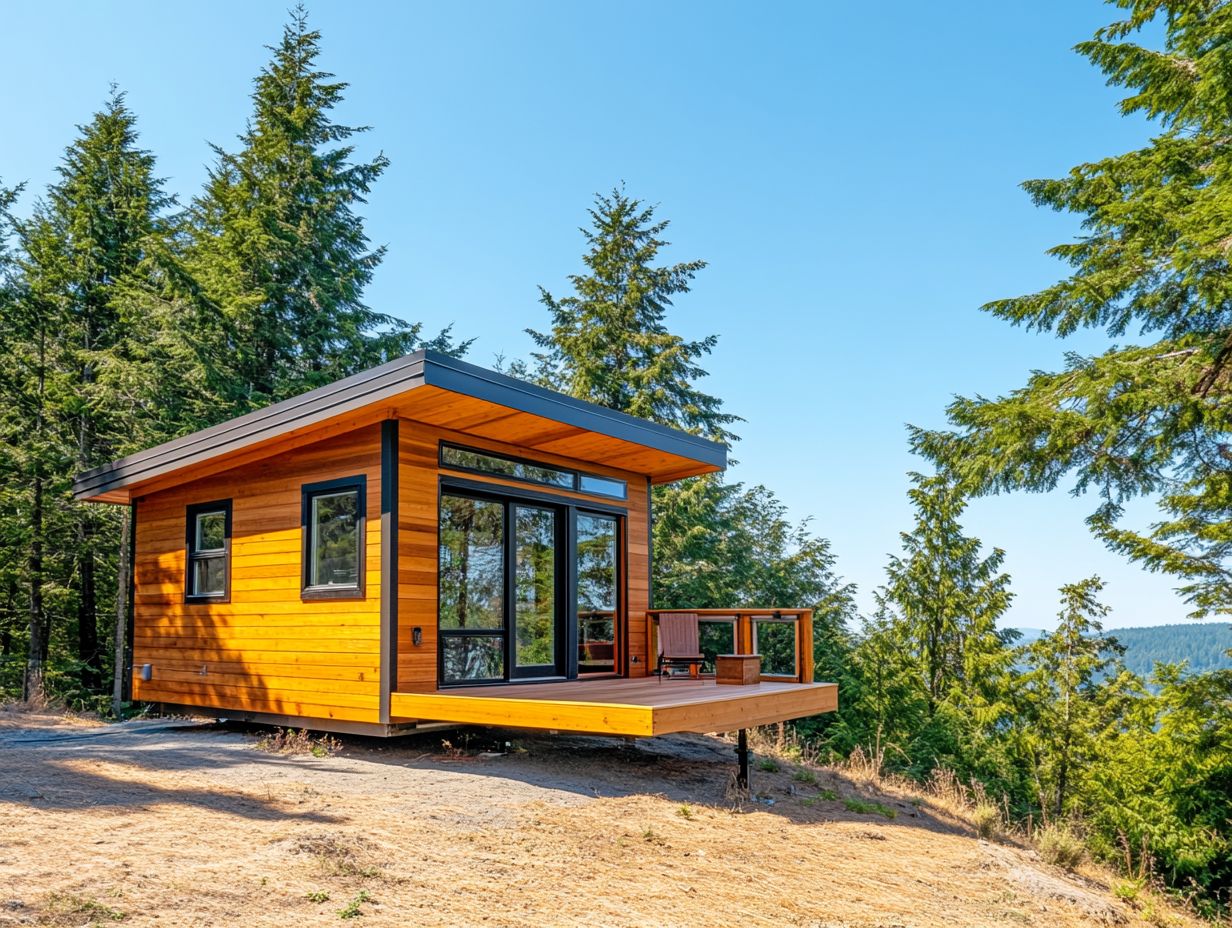
Yes, you will need a building permit to construct a tiny house, just like any other residential structure. Requirements may vary by location.
Can I park my tiny house on someone else’s property without their permission?
No, you must have the property owner’s permission before parking your tiny house on their land. Otherwise, you risk trespassing and facing legal consequences.
Do I need to have a specific type of insurance for my tiny house?
Yes, it is advisable to have insurance for your tiny house, similar to any other home. The type and amount of coverage needed may vary based on your location and how you use your tiny house (e.g., primary residence, vacation home, rental).
Are there any legal restrictions on where I can park my tiny house?
Yes, there may be zoning laws about where you can park your tiny house. Some areas allow it only in designated tiny house communities or have specific size and location requirements.
Can I permanently live in a tiny house on wheels?
Thinking of living in a tiny house on wheels? Act now understand the local rules first!
The laws regarding tiny houses on wheels are evolving. You must research local rules and regulations before you decide to live in one.

